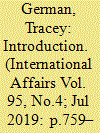| Srl | Item |
| 1 |
ID:
167119


|
|
|
|
|
| Summary/Abstract |
Russia's actions in Ukraine, the rise (and apparent fall) of Islamic State in Syria and northern Iraq, and Chinese activity in the South China Sea have kindled renewed debate about the character of war and conflict, and whether it is undergoing a fundamental shift. Such reflections and assertions about the apparent transformation of conflict are not new; one of the enduring features of conflict over the centuries has been its state of flux. What is new is the pace of such change, accelerated by the ongoing technological and communications revolution. Individuals can now communicate and engage with one another across state boundaries to an unprecedented extent and in new ways, adding to the complexity of the international environment. The debate about whether the character of conflict is changing is not a purely philosophical pursuit: it has real-world implications, for how states envision the character of conflict shapes how they plan and prepare for war, from defence policy to procurement and from doctrine to training. Thus, it is imperative to consider the types of conflict in which states perceive themselves to be, or risk becoming, involved. That is what this special issue of International Affairs sets out to do, exploring how different states plan for and predict the future character of war and conflict, how the experiences of individual states foster different visions of future conflict and how states envisage military force being used, either by themselves or by potential adversaries.
|
|
|
|
|
|
|
|
|
|
|
|
|
|
|
|
| 2 |
ID:
072693


|
|
|
|
|
| Publication |
2006.
|
| Summary/Abstract |
How does war affect the structure of domestic interests in democratic capitalist states and how are these interests reflected in the conduct of the war? Developing a second image reversed 'plus' argument (outside-in and then inside-out), I contend that war can alter the domestic balance of political power, and can thereby affect the orientation of a state's security strategy. Wars that induce the extraction of wealth and the mobilization of resources will empower a coalition of domestic actors and interest groups who will lobby the government for an offensive security policy, including greater defense spending, military and industrial conscription, state planning and intervention in the economy, and protectionism. I apply this model to Britain and use a research design based on a longitudinal-controlled comparison over the periods of 1912-1914 and 1914-1916 to examine why Britain escalated its involvement in World War I from Limited Liability prior to the outbreak of the war and during the initial years of the war to a Continental Commitment by April of 1916.
|
|
|
|
|
|
|
|
|
|
|
|
|
|
|
|